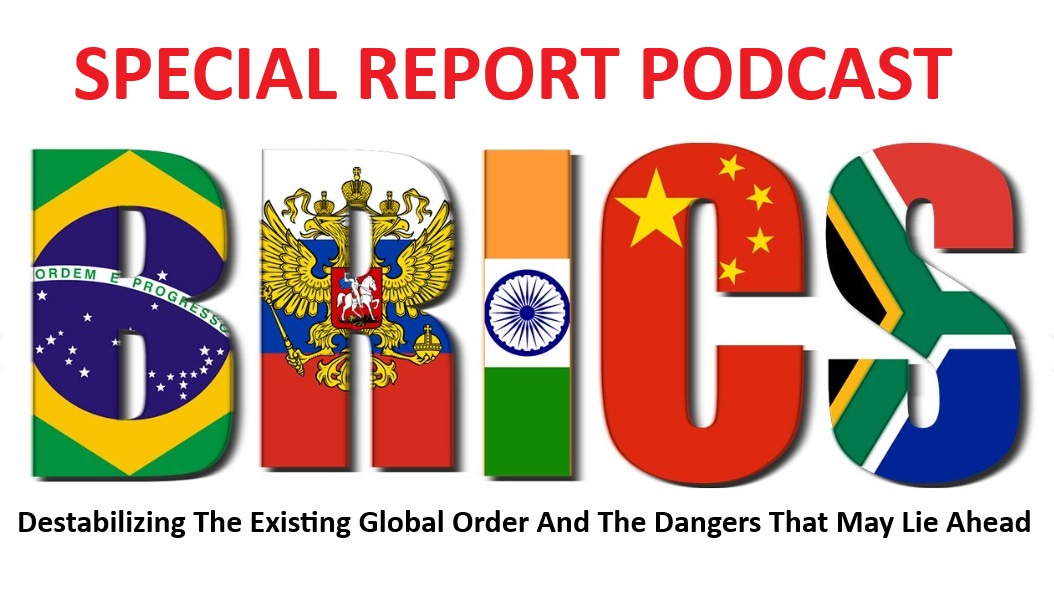In today's special episode we're exploring the BRICS summit in Kazan, Russia, happening from October 22nd to 24th, 2024. This summit brings together leaders from Brazil, Russia, India, China, and South Africa to discuss a bold initiative: reducing the bloc's dependence on the US dollar.
Amidst ongoing efforts to reshape the global financial landscape, Russia and Iran are leading the charge toward a new financial system that aims to be independent of Western influence. While China's support adds momentum to the initiative, India's cautious stance highlights the complexities within the BRICS bloc. The inclusion of Iran adds an intriguing ideological element, raising questions about how economic priorities and political differences will play out.
Join us as we break down the diverse motivations driving each member, the potential impacts on the global order, and what this push for a more multipolar world could mean for the future.
SHOW NOTES
The 16th annual BRICS summit will be held in Kazan, Russia, from October 22-24, 2024. This year's summit is especially concerning, given its objectives amidst escalating geopolitical tensions that have been mounting since the COVID-19 pandemic. These tensions include the war in Ukraine, conflicts in the Middle East, and disputes over Taiwan. While appearing isolated in nature, these events are all connected. We explore the potential implications, including the destabilization of the existing global order, the erosion of the globalization framework that has served us well for decades, and the undermining of the current financial system.
The BRICS bloc, consisting of Brazil, Russia, India, China, and South Africa, has launched efforts to challenge the dominance of the U.S. dollar in global finance. Russia, with strong backing from Iran, is leading this initiative, seeking to create a financial system that operates independently of Western influence. The upcoming BRICS summit in Kazan will feature leaders from over 24 countries discussing plans to establish a new payments infrastructure, possibly including digital currencies or a BRICS-based currency. The primary goal is to reduce dependence on the dollar and diminish the geopolitical power the U.S. wields through its financial system.
Russia's motivation stems largely from the economic consequences of Western sanctions following its invasion of Ukraine, which have significantly disrupted its economy. By advancing the BRICS initiative, Russia hopes to weaken the U.S.-dominated global financial architecture that facilitates sanctions and political leverage. The group's expansion and focus on financial independence signal a more determined effort to challenge the existing financial order, particularly as other BRICS members share an interest in creating alternatives to the dollar.
The responses of BRICS members to this initiative vary. China supports it as it aligns with its strategy to internationalize the yuan and reduce vulnerability to U.S. sanctions. China has already been developing alternatives to dollar-based systems through digital payment platforms and currency agreements. Meanwhile, India is more cautious, especially regarding proposals for a common BRICS currency, due to concerns about China's influence and differing geopolitical interests. This reflects the internal complexities of achieving consensus within BRICS.
The involvement of new members like Saudi Arabia, the UAE, Argentina, and Egypt adds further diversity to the group. While these nations are attracted to the idea of diversifying away from the dollar, they may approach the initiative cautiously because of their longstanding economic ties with the U.S., especially regarding oil and trade. Brazil and South Africa, on the other hand, see the initiative as an opportunity to secure economic growth, diversify trade, and advocate for a fairer financial system that benefits developing countries. Each participant has unique motivations, yet they share a general desire to reform the global financial system and reduce the dollar's dominance.
Iran's involvement brings an additional ideological dimension to the BRICS initiative. For Iran, challenging the U.S.-led financial system is not just a geopolitical move but also a religious and ideological one. Iran’s leadership views resistance to Western influence as a moral and religious duty, connected to its revolutionary ideology that opposes U.S. hegemony. Iran sees financial independence from the dollar as a way to further its vision of Islamic governance and reduce Western economic control. This ideological stance makes Iran more willing to push for confrontational approaches within the BRICS framework.
The potential clash between Iran's religiously motivated goals and the more pragmatic objectives of other BRICS members could pose risks to the initiative. While countries like Russia may share Iran's desire to weaken U.S. influence, other members, such as China and India, are more focused on economic and strategic interests than ideological conflict. China, in particular, values its economic ties with Western countries and may not want to be associated with Iran's anti-Western rhetoric. Similarly, India balances its relationship with Iran alongside partnerships with the U.S. and Israel, making it cautious about aligning with Iran’s ideological goals.
Iran's religious ideology also affects its approach to regional conflicts. It aims to use any financial gains from the BRICS initiative to support its proxies across the middle east including Hezbollah in Lebanon and Hamas in Gaza, both recognized by the West as terrorist organizations, Shia militias in Iraq, and the Houthi movement in Yemen. This could provoke concerns among other members wary of exacerbating tensions with the West. The risk of appearing to support Iran's agenda could alienate members like Brazil and South Africa, who are focused on economic development and prefer to avoid entangling the BRICS initiative in ideological disputes. This divergence in objectives underscores the potential challenges in maintaining the group's cohesion.
Despite these internal differences, BRICS remains united in its desire to establish a more multipolar financial order that reduces Western influence. Establishing a new financial system involves significant challenges, including ensuring liquidity, regulatory cooperation, and governance structures. Geopolitical distrust, particularly between China and India, could complicate efforts to implement a unified strategy. While Iran’s ideological stance might motivate stronger efforts to challenge the West, other members may advocate for more incremental changes to avoid confrontation.
Russia, Iran, China, South Africa, and Brazil each have distinct endgames. Russia seeks to erode U.S. financial dominance and reassert itself as a global power. Iran aims for greater financial freedom to support its regional ambitions, driven by both geopolitical and religious objectives. China’s long-term goal is to internationalize the yuan and reduce its reliance on the dollar, positioning itself as the world’s leading economic power. South Africa and Brazil prioritize economic diversification and regional leadership, driven by practical considerations rather than ideological ones. These varied motivations illustrate the complexity of the BRICS initiative.
In conclusion, while the BRICS financial initiative is broadly aimed at reforming the global financial system, Iran’s religious and ideological agenda adds a unique layer to the group’s objectives. This dimension could create tensions, especially if Iran pushes for a more confrontational approach than what other members are willing to support. Nonetheless, the initiative highlights a shared interest among emerging economies in challenging the current order and signals a shift toward a world where the balance of power is increasingly contested. The future of the BRICS initiative will depend on how well the group can navigate these differences and implement a coherent strategy.
Politically, the world appears to be in its most fragile state since the end of the cold war in 1991. Thirty four years of peace and prosperity may be coming to an end. We should all sit up and take notice because we are now sailing through uncharted waters and have no idea of the dangers that may lie ahead.
















Share this post